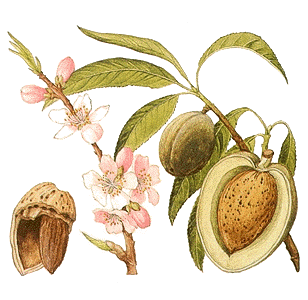Therapeutic constituents:
Principal Constituents, A globulin called amandin.
Almonds are extensively used in confectionery and also for pharmaceutical and cosmetic preparations. Almond kernels are considered a highly nutritious, demulcent and stimulant nervine tonic in indigenous medicine. They are also considered lithontriptic and diuretic.
Almond kernel is a demulcent, which is an agent that forms a soothing film over mucous membranes, relieving minor pain and inflammation. Almond skin is rich in antioxidant flavonoids while the fruit is rich in magnesium, which promotes blood circulation. It also contains the chemical selenium and vitamin E, both of which are known to benefit the skin.
Key therapeutic benefits:
- Almonds promote cardiovascular health because of the high levels of monounsaturated fat in the nut, which is known to reduce the risk of heart disease. The high content of potassium in Almonds helps maintain normal blood pressure levels, as well as heart rate.
- The vitamin E and selenium in Almonds are useful in fighting the aging process. The oil also prevents the formation of premature wrinkles, pimples, and dry skin. Almond oil is recommended for a wide range of hair problems, such as dandruff and hair fall. It also promotes hair growth and combats premature graying.
Used in Orgado


